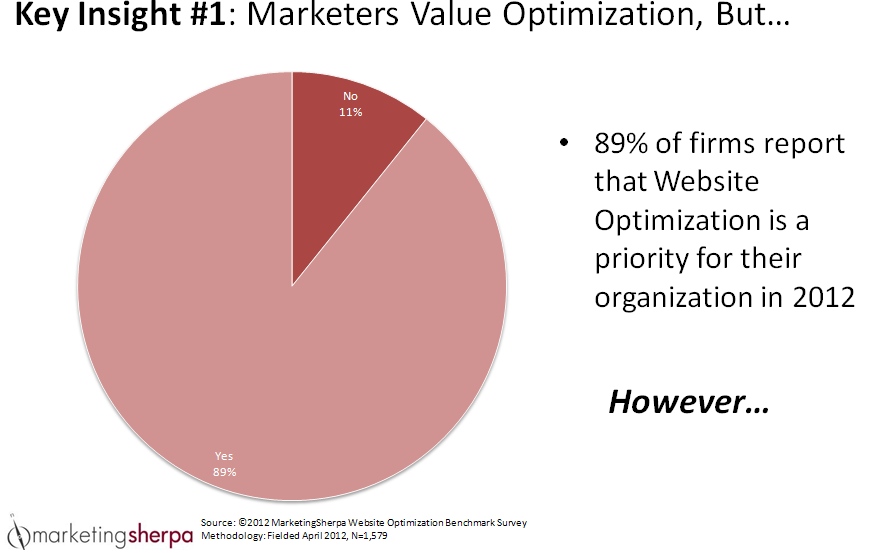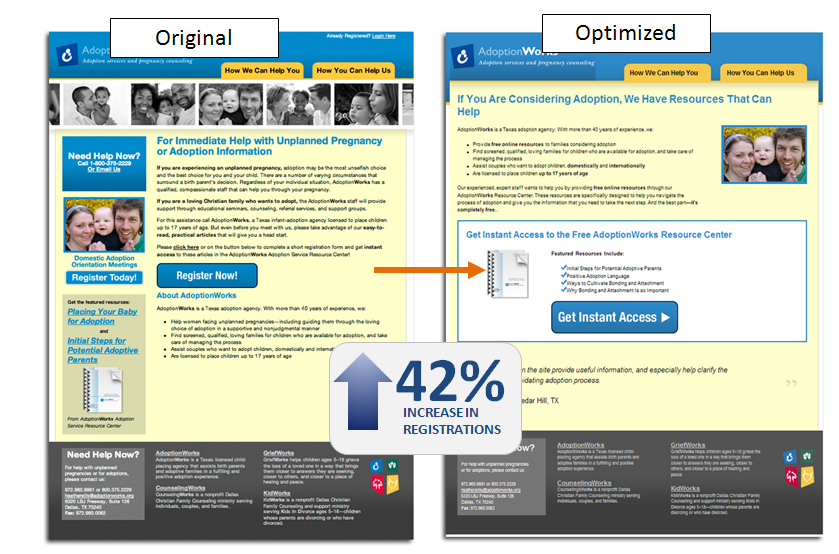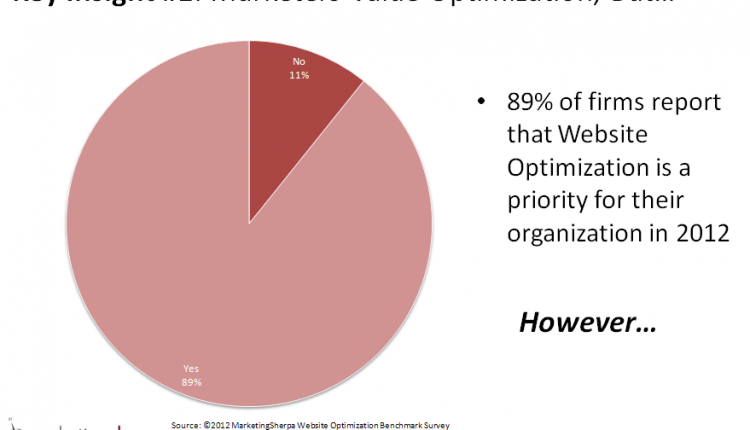Dr. Flint McGlaughlin, Managing Director, MECLABS (the parent company of MarketingExperiments), opened Optimization Summit 2012 in Denver on Tuesday, June 12, with a presentation on the state of website optimization in 2012.
Flint offered some data points on testing and optimization, gave the audience the three key principles in optimization compiled in over a decade of experimentation at MECLABS, and provided real-life examples of marketing practitioners who are applying testing and optimization to improve their efforts.
First, some data points on how marketers are utilizing testing and optimization:

MECLABS research found that 89% of surveyed companies report that website optimization is a priority in 2012.
On this figure, Flint says, “That seems compelling, and that seems exciting.”
But, he cautions that the follow-up is not as encouraging:

A mere 38% of companies surveyed for the upcoming MarketingSherpa 2012 Landing Page Optimization Benchmark Report have positive ROI on the optimization efforts, and 3% actually reported negative ROI. A full 53% either could not, or did not, calculate ROI on their testing and optimization programs.
The Marketing-IT relationship
He adds that the important relationship within a company engaged in testing and optimization is between Marketing and Information Technology. He says there needs to be a “symbiotic relationship” between these two business functions for a successful optimization program.
Are your tests valid?
This relationship will help facilitate valid tests, which is a challenge according to MECLABS research. When asked about test validity, 47% of surveyed marketers reported being confident that the tests were valid. However, 32% reported they were not confident the testing program was statistically valid, and 21% reported not knowing whether the optimization effort was valid.
And, 85% of surveyed marketers reported not even tracking validity for their testing programs.
Flint says the problem is a majority of optimization efforts and test protocols are based on best practices and intuition, not science. This means the tests are settling on adequacy, and not seeking the best possible results.
To help reverse some of these negative testing and optimization trends, Flint offers three principles based on more than a decade of testing research at MECLABS and MarketingExperiments:
- Asking “how” leads to information; asking “why” leads to wisdom. Yet marketers are all too busy asking how.
- Sometimes we need to slow down to go fast. Action is overrated; action should be grounded in contemplation. Admittedly, contemplation without action is anemic, but then action without contemplation is dangerous.
- Indeed, the marketer should be the philosopher of the organization — for the vigorous action of Sales needs to be grounded in the rigorous contemplation of Marketing.
A real-life optimization example
To illustrate how successful testing and optimization looks in practice, Flint brought on stage Tim Kachuriak, Senior Vice President, Innovation and Optimization, Pursuant.
Tim was an attendee of last year’s inaugural MarketingSherpa and MarketingExperiments Optimization Summit, and he immediately applied learnings from that event to improve website performance for a client, Adoption-Works.org.

The 42% increase in registrations was achieved through testing a single treatment against the control.
Tim says the idea of the treatment was to increase the force of the offer, in this case create website registrations by offering access to the online resource center.
He adds the control had issues in that it was essentially addressing two different audiences, and the page included multiple offers. The treatment simplified the goal of the page to simply offer access to the resource center.
Tim states, “We realized that the people coming to this landing page were entering into a conversation with us, and it was a conversation they began by typing certain words into the search engine. We wanted to meet them there and provide them with an answer to the question they asked: ‘How do I make a decision about adoption?’”
He also offers his key learning from this successful test, “The big takeaway from this test is focusing on communicating greater value and more relevance to the person coming to the page.”
Related Resources:
The Boston Globe: An inside look at launching a paid content site
Landing Page Optimization: 3 quick recommendations from the stage at Optimization Summit 2012
Optimization: Testing program leads to 638% increase in new accounts
Optimization and Testing: 800,000 emails sent, 1 major lesson learned
What to Test: 4 sample landing page treatments from Optimization Summit 2012




Thanks for the helpful tips and imparting your knowledge through this one. Big Help!